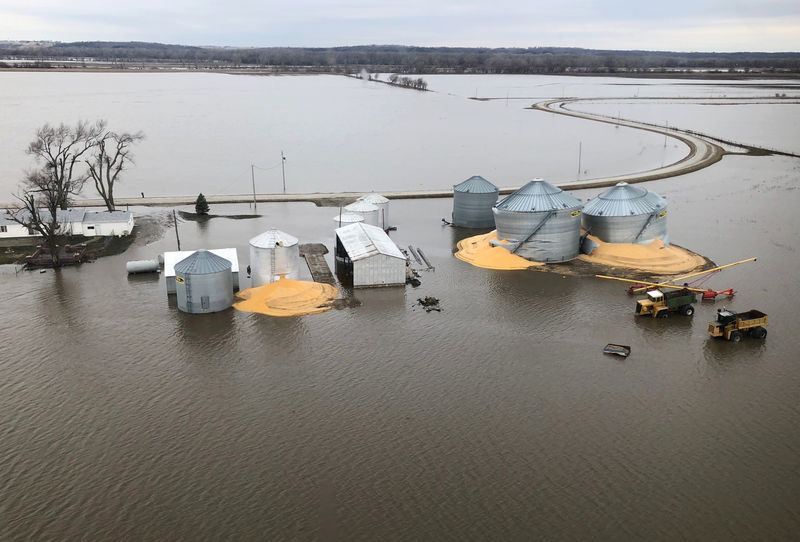By Maria Caspani
NEW YORK (Reuters) - Only 200 miles separate Michael Tilden and Miranda Garcia in rain-soaked Iowa. But they are worlds apart when it comes to their opinion of the weather.
Garcia, a 38-year-old former journalist and Democrat from Des Moines, thinks flooding has been getting worse in the state, which just came out of its wettest 12-months on record. Tilden, a 44-year-old math teacher and Republican from Sioux City, thinks otherwise: “I’ve noticed essentially the same weather pattern every single year," he said.
Their different takes underscore a broader truth about the way Americans perceive extreme weather: Democrats are far more likely to believe droughts, floods, wildfires, hurricanes and tropical storms have become more frequent or intense where they live in the last decade, according to a Reuters/Ipsos poll https://tmsnrt.rs/2XY4s9j.
The divergence shows how years of political squabbling over global warming - including disputes over its existence - have grown deep roots, distorting the way Americans view the world around them. The divide will play into the 2020 election as Democratic hopefuls seek to sell aggressive proposals to reduce or even end fossil fuel consumption by drawing links between climate change and recent floods, storms and wildfires.
Nearly two-thirds of Democrats believe severe thunderstorms and floods have become more frequent, compared to 42% and 50% of Republicans, respectively, according to the poll.
About half of Democrats, meanwhile, think droughts, hurricanes and tropical storms are more common in their region, versus less than a third of Republicans, according to the poll.
Similarly, nearly seven in 10 Democrats said in the poll that severe weather events such as thunderstorms have become more intense, compared to 4 of 10 Republicans. And nearly half of Republicans said there has been no change in the intensity of severe weather over the past decade, versus a fifth of Democrats.
The Reuters/Ipsos poll was conducted online in English between June 11 and 14 and gathered responses from 3,281 people. It has a credibility interval, a measure of precision, of 2 percentage points up or down. (GRAPHIC: https://tmsnrt.rs/2XY4s9j )
U.S. government researchers have concluded that tropical cyclone activity, rainfall, and the frequency of intense single-day storms have been on the rise, according to data compiled https://www.epa.gov/climate-indicators/weather-climate by the Environmental Protection Agency.
For example, six of the 10 most active years for tropical cyclones in the Atlantic basin since 1950 have occurred since the mid-1990s, and nine of the top 10 years for extreme one-day precipitation events nationwide have occurred since 1990, according to the data.
“We do expect to see more intense storms," said David Easterling, a spokesman for the National Oceanographic and Atmospheric Administration's National Centers for Environmental Information.
An overwhelming majority of scientists believe human consumption of fossil fuels is driving sweeping changes in the global climate by ramping up the concentration of heat-trapping gases in the atmosphere. But it is impossible to draw a direct link between the changes in U.S. weather in the recent past to the larger trend of warming.
President Donald Trump has cast doubt on the science of climate change, saying he believes that research into its severity, causes and effects is not yet settled. Two years ago he announced the United States would withdraw from a global pact to reduce carbon emissions, the Paris Climate Agreement, a deal Trump said could damage the U.S. economy.
Still, a majority of Republicans believe the United States should take "aggressive action" to combat global warming, Reuters polling shows https://www.reuters.com/article/us-usa-election-climatechange/americans-demand-climate-action-reuters-poll-idUSKCN1TR15W.
Some Republican lawmakers have offered proposals for "market-based" approaches to fend off climate change, such as cap-and-trade systems that would force companies to cut carbon emissions or buy credits from those that do.
Democrats are pushing more aggressive ideas. Nearly all of the party's presidential hopefuls, who seek to unseat Trump in next year's election, have put forward proposals to end U.S. fossil fuels consumption within a few decades to make the country carbon neutral.
Trump has slammed the idea, saying it would "kill millions of jobs" and "crush the dreams of the poorest Americans."
PARTISAN GOGGLES
Jennifer Marlon, a research scientist at the Yale Program on Climate Change Communication, said the divergence in the way American perceive the weather is being driven by factors including the news they consume and their social circles.
Liberals are more likely to expose themselves to news outlets and people who believe climate change is an urgent threat that affects current weather patterns. For more conservative Americans, the link between weather and climate change is "not a typical conversation," Marlon said.
Last year, the Yale program - which carries out scientific research on public knowledge about climate change - set out to map the partisan divide on how people perceive the effects of global warming across the United States.
It found that 22% of Republicans reported personally experiencing climate change, compared to 60% of Democrats.

Scientists and researchers at the University of Michigan, the University of Exeter and others came to a similar conclusion in a 2018 study which found that political bias and partisan news reporting can affect whether people indicate experiencing certain extreme weather events.